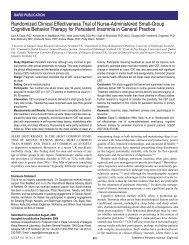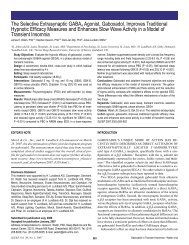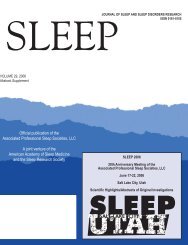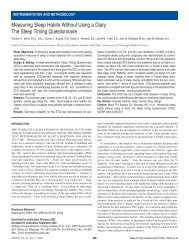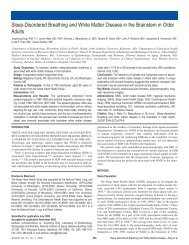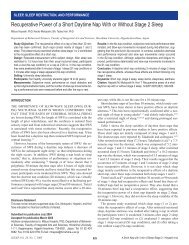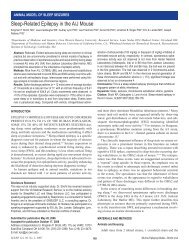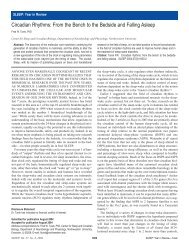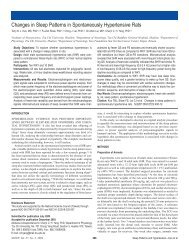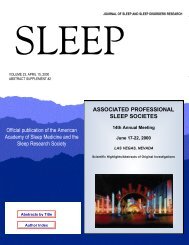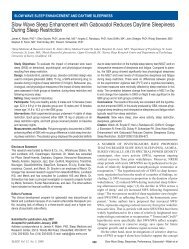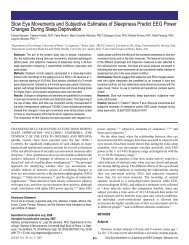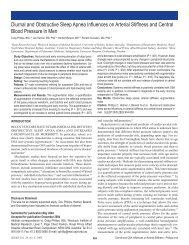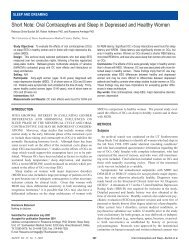SLEEP 2011 Abstract Supplement
SLEEP 2011 Abstract Supplement
SLEEP 2011 Abstract Supplement
Create successful ePaper yourself
Turn your PDF publications into a flip-book with our unique Google optimized e-Paper software.
B. Clinical Sleep Science IX. Psychiatric and Behavioral Disorders and Sleep<br />
0710<br />
HIGH-FREQUENCY <strong>SLEEP</strong> EEG IN ABSTINENT<br />
ALCOHOLICS COMPARED TO HEALTHY CONTROLS<br />
Arnedt J, Hoffmann RF, Conroy DA, Armitage R, Brower K<br />
Psychiatry, University of Michigan, Ann Arbor, MI, USA<br />
Introduction: The underlying neurophysiological mechanisms of sleep<br />
disturbances in recovering alcoholics and their relationship to relapse<br />
are poorly understood. We tested the hypothesis that high-frequency<br />
sleep EEG would be increased in alcohol-dependent (AD) participants<br />
compared with healthy controls (HC), particularly among those who relapsed.<br />
We also examined sex and race differences in high-frequency<br />
sleep EEG.<br />
Methods: Fifty-three ADs (36.6 ± 10.8 years, 10 women, 12 African<br />
American, 34 Caucasian) in early recovery (39.8 ± 19.1 days abstinent)<br />
and 19 age-matched HCs (35.6 ± 10.0 years, 4 women) participated.<br />
Following a 2300 - 0600 hours at-home sleep schedule and screening,<br />
participants underwent a baseline (2300 - 0600 hours) sleep night with<br />
polysomnography (PSG). Power spectral analyses were conducted on<br />
all 30-second artifact-free epochs and averaged by hour of the night in<br />
the beta frequency band (β=16-30 Hz). We examined raw and relative<br />
beta power (beta power/total power) across the entire night and by hour<br />
of the night. Alcoholic participants returned after 12 weeks to assess<br />
abstinence vs. any drinking with the Time Line Follow Back interview.<br />
Results: Relative beta power across the night was significantly higher<br />
in AD compared to HC participants (4.1 ± 0.7% vs. 3.7 ± 0.7%, p <<br />
.05) and in African American compared to Caucasian subjects (4.6 ±<br />
0.8% vs. 3.9 ± 0.6%, p < .04). AD men had higher relative beta power<br />
than HC men (p < .05), but no differences were found among women.<br />
AD participants who relapsed during the 12-week follow-up had higher<br />
relative beta power than abstinent AD and HC participants (p < .05). No<br />
other demographic, sleep, or alcohol-related variables were associated<br />
with relapse.<br />
Conclusion: High-frequency sleep EEG was increased in AD vs. HC<br />
subjects, particularly among relapsers. CNS hyperactivity may be one<br />
mechanism of sleep disturbance in AD subjects that predicts relapse during<br />
recovery.<br />
Support (If Any): NIH R01 AA016117 & K24 AA00304 (K Brower)<br />
0711<br />
THE EFFECT OF QUETIAPINE ON <strong>SLEEP</strong> DURING<br />
ALCOHOL ABSTINENCE<br />
Chakravorty S 1,2 , Kuna ST 1,2 , Ross RJ 1,2 , Witte L 1 , Oslin D 1,2<br />
1<br />
Philadelphia VAMC, Philadelphia, PA, USA, 2 University of<br />
Pennsylvania School of Medicine, Philadelphia, PA, USA<br />
Introduction: Insomnia is highly prevalent in the recovering alcoholic<br />
patient, and has been shown to be a risk factor for relapse. Quetiapine,<br />
a novel antipsychotic medication with hypnotic properties, is frequently<br />
prescribed on an “off-label” basis for insomnia in these patients. The<br />
effect of quetiapine on objective and subjective sleep in the recovering<br />
alcoholics is currently unknown.<br />
Methods: Male alcoholics (N = 24), within the first year of recovery<br />
were recruited in an 8-week, double-blind, placebo-controlled trial. Participants<br />
were randomized to receive either 400 mg/day at bedtime, of<br />
quetiapine (N = 12), or placebo (N = 12). Two baseline polysomnograms<br />
were conducted before and after 8 weeks of treatment. The primary<br />
outcome measure was Sleep Efficiency on an in-laboratory polysomnogram.<br />
The principal secondary outcome measure for subjective sleep<br />
was the Insomnia Severity Index (ISI) total score. In addition, during<br />
this treatment trial, participants were evaluated for neuro-behavioral<br />
assays, addiction, and psychiatric variables using standardized instruments.<br />
They also received the standardized psychotherapy called Medical<br />
Management to help them cope with their urge to use alcohol.<br />
Results: We report the preliminary study results on the participants who<br />
completed the study [quetiapine (N = 10), and placebo (N = 10)]. Sleep<br />
Efficiency, on an in-laboratory polysomnogram, before and after the<br />
treatment showed a trend for the effect of Time, F(1, 19) = 3.99; p =<br />
0.06; no effect of Medication status was seen. In addition, there were<br />
significant effects of time, without any effect of medication status, for<br />
the following variables: Insomnia Severity Index, PHQ-9 scores, Beck’s<br />
Anxiety Inventory, and the Penn Alcohol Craving Scale. There were no<br />
differences between the groups for the number of Lapses, or the 10%<br />
Fastest Reaction Time scores on the psycho-motor vigilance task. Analysis<br />
of the participants with baseline insomnia [ISI total score ≥ 8, quetiapine<br />
(N = 10), placebo (N = 7)] showed a differential improvement<br />
in insomnia (ISI total score) over time with quetiapine as compared to<br />
placebo [Drug F(1,13) = 7.77, p = 0.015, Time F(8,101) = 20.35, p <<br />
.001, Drug * Time F (8, 101) = 1.90, p = .06; AIC = 653].<br />
Conclusion: Quetiapine was associated with improvement in subjective<br />
insomnia ratings only in the alcohol dependent participants with<br />
baseline insomnia.<br />
Support (If Any): This study was funded by the MIRECC, VISN-4,<br />
Department of Veterans Affairs.<br />
0712<br />
DIM LIGHT MELATONIN ONSET (DLMO) IN ALCOHOL-<br />
DEPENDENT (AD) MEN AND WOMEN VS. HEALTHY<br />
CONTROLS<br />
Conroy DA, Hairston IS, Arnedt J, Hoffmann RF, Armitage R,<br />
Brower K<br />
Psychiatry, University of Michigan, Ann Arbor, MI, USA<br />
Introduction: Sleep disturbances in AD patients may persist for years<br />
despite abstinence from alcohol. Although the mechanisms are not well<br />
understood, dysregulation of circadian rhythms has been suggested. One<br />
study in African-American men showed a delay in peak melatonin volumes<br />
in AD vs. healthy control (HC) subjects (Kühlwein et al., 2003),<br />
but DLMO has not been assessed in either Caucasians or women with<br />
alcoholism.<br />
Methods: Forty-four AD participants (AD, mean age 36.8 ± 10.5 years,<br />
10 women) in early recovery (mean abstinence 57.7 ± 19.5 days) and<br />
19 age- and sex-matched controls (HC, mean age 34.8 ± 10.7 years,<br />
5 women) participated. Following a 2300 - 0600 hours at-home sleep<br />
schedule, a screening and a baseline night of polysomnography, participants<br />
underwent a 3-hr extension of wakefulness (0200 - 0900 hours)<br />
during which salivary melatonin samples were collected every 30 minutes<br />
beginning at 1930 hours. The time of DLMO was the primary variable.<br />
Other variables included area under the curve (AUC) and course of<br />
melatonin values across time points.<br />
Results: No significant differences between the AD and HC groups were<br />
found for any outcome variable, analyzing men and women together.<br />
Likewise, no significant differences were seen in women with and without<br />
AD. In men, however, DLMO was significantly delayed in AD vs.<br />
HC subjects [21:17 (0:44) vs. 20:51 (0:28) hr; t=-2.4, p=.025]; the AUC<br />
was higher in HC than AD subjects [111.5 (61.7) vs. 78.4 (43.4) pg/ml;<br />
t=2.1, p=.046]; and repeated measures ANOVA revealed a main effect<br />
for diagnosis on mean melatonin volume [F(1, 38)=6.3, p=.016]. When<br />
analyzing Caucasian men only (30 AD & 17 HC), DLMO remained significantly<br />
delayed in AD subjects.<br />
Conclusion: These results extend the findings of Kühlwein et al. to<br />
Caucasian men. Further research should consider sex differences in the<br />
mechanisms underlying sleep disturbances in AD.<br />
Support (If Any): Grants AA016117 & AA00304 (K Brower)<br />
A245<br />
<strong>SLEEP</strong>, Volume 34, <strong>Abstract</strong> <strong>Supplement</strong>, <strong>2011</strong>



